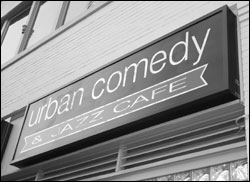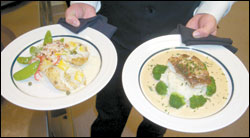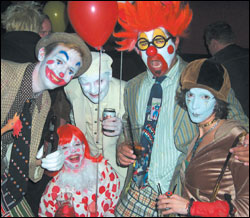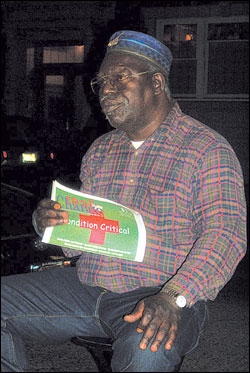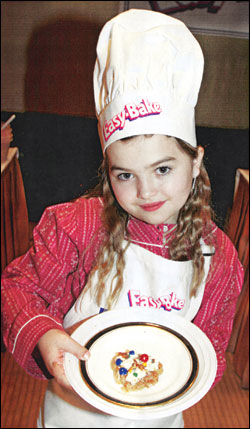IT’S A THURSDAY night in December, one week after the 24th annual Seattle International Comedy Competition, and winner Drake Witham, a 30-year-old UW grad, has returned to the Comedy Underground in Pioneer Square for a triumphant, post-victory performance. There are only 15 paying customers in the room. The evening is dominated by one highly intoxicated patron who spends most of the show shouting, waving her hands in the air, and interrupting jokes.
After the show, I head upstairs to Swannies, where 1995 competition winner David Crowe offers Witham adviceencouraging him to exploit his “title” as much as possible before next year’s winner is crownedand offers me some general reflections on Seattle’s comedy scene. “Seattle is the freakiest comedy town I’ve been to . . . I want to say retarded,” Crowe says. “It’s the only market of this size without an ‘A’ club. You’ll go to Columbus, Ohio, and they’ve got a palace, and then you come here [the Comedy Underground] to the room that’s a comedy club because nobody else wanted to rent the space.”
Is Seattle really such a crappy comedy town? Is our stand-up scene really so beaten down? Seattle has three clubs exclusively doing stand-up comedy, including a brand-new downtown space called the Urban Comedy and Jazz Caf鮠And many venues, such as local casinos, Pegasus Pizza, and the Jewel Box Theatre at the Rendezvous, are starting to have stand-up eveningsmuch to the chagrin of the club owners. “The comedy pie is small enough as it is,” grouses Giggles owner Terry Taylor. “The last two years, business has fallen off by 25 percent.”
The opening of the Urban Comedy and Jazz Caf頼/B>(1921 Fifth Ave., 206-956-0555) is a big bet against those trends. Owner Bob Davis founded Giggles 20 years ago, when stand-up was first starting to take off. He sold the club six years ago because, he says, the bar business wore him down. Now that his non-compete clause with Giggles has expired, he’s ready to go. “I haven’t done a hell of a lot in the last five years, so I figured I better get to work again,” Davis says. The Urban is nonsmoking and has a nice sound system going for it, along with a downtown location across from the Westin. The room is long and narrow, and kept at the perfect temperature if David Letterman wants to drop by (i.e., a bit chilly). Though it has a kitchen, there’s no food being served as yet. A recent Friday 10 p.m. show had an audience of about 20.
Davis says he’ll distinguish his new venue by bringing in big names. For instance, he has Margaret Chowho previously played the Paramount and Benaroya Hallscheduled for Jan. 23 and 24 ($30). However, famous comedians do not guarantee big business. Davis booked the neurotic Richard Lewis to appear last month, but a couple weeks before the show he told me that ticket sales were very slow. Eventually Lewis canceled due to a “scheduling conflict.” As for other happenings at the Urban, the jazz has not started yet, but it should begin this year. But Davis’ real moneymaker may be a planned new “gentlemen’s club” next door, Club Shangri-la, which is expected to feature “lovely ladies” (mostly Asian) to share soft drinks and dances with guests for 25 bucks an hour. (No stripping or alcohol, though.)
Terry Taylor bought Giggles (5220 Roosevelt Way, 206-526-5653) from Davis, and most nights he runs the place as a low-overhead, one-man operation (plus a cook): He sells the tickets, takes the food/drink orders, makes the drinks, manages sound, and performs other duties as necessary. Giggles is the city’s largest comedy room and probably its most popular, but the stage is awkwardly placed, and the sound system is often piercingly loud. Shows at Giggles do sell out, especially because Taylor books better-known comedianspeople who’ve appeared on Leno, Conan, etc. Taylor can afford famous names because he generally charges more than the other clubs (cash only) and usually requires a drink minimum. The food is pricey (e.g., a $9 burger), as are the drinks, but a hot comic can make it worth the expense.
The granddaddy of Seattle clubs is the Comedy Underground (222 S. Main St., 206-628-0303), and the name does not lie: You find it beneath the streets of Seattle, under Swannies bar. Open since 1981, the club is a low-budget operation that focuses on unknown comics. “We can’t afford the same talent that Giggles can,” says co-owner Carl Warmenhoven. Well-kept, if dated (the floor near the entrance is no longer levelit rolls), the Underground’s walls are lined with publicity photos of now-famous comedians who once played the club, such as Dana Carvey, Ellen DeGeneres, and Mitch Hedberg. If you go to a show there, odds are it will be funny and the comedian will be famous sometime down the line (and then never come back to the club).
On top of these three, Seattle may yet get the “A” venue that Crowe was talking about. The building that’s currently home to the Showbox was once a branch of the Improv, a powerful 16-city chain of stand-up venues that books large rooms and major headliners. For years now, there have been rumors concerning the Improv and Seattle. A year ago, the Improv announced it would take over the empty Planet Hollywood space downtown, but that never materialized. Gail O’Brien, the manager of the Improv in Irvine, Calif., fans the rumors without settling them: “I did hear that [Seattle] was maybe going to be the next club they open, and I would think within this next year. But I cannot say for sure.” Looks like the Seattle comedy cream pie could be sliced even finer.
